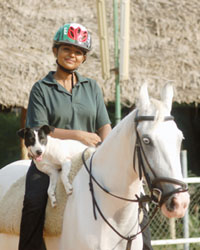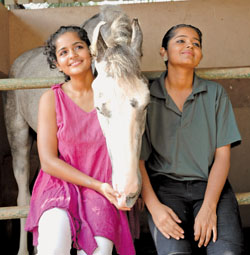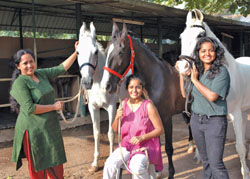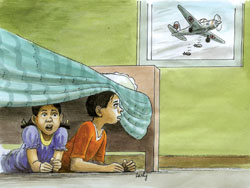
An equestrian's quest for perfection
Suharshi Perera
|

EQUESTRIAN: Thiloshini Abesekara with her dog on horse back
|
HORSE LOVER: It was a surreal scene straight out of the
Nicholas Evans bestseller The Horse Whisperer. Here I was, whispering
sweet nothings into the right ear of a majestic-looking horse, my
diminutive frame dwarfed by his massive bulk. The horse comes closer,
nudging me softly, nestling its head on my shoulder. We connected,
bridging the immeasurable gap between man and beast.
But the horse and I are not alone. Someone who has lived with horses
practically all her life and knows them inside out, is observing the
nascent friendship developing between us. A young girl in black boots,
she gives me more advice on courting the horse.
"You approach from the front. Speak softly, let him get your scent,
pet him, cuddle him, communicate in body language and let him observe
you. Surely he'll like you".
Thiloshini Abesekara knows what she is doing, having grown up with
them. She is their playmate, mentor and healer. Horses have become an
indispensable part of her life. When I visited her family stables, there
were around six of them freely playing.
"We all are passionate about them," says Thiloshini. All her family
members are horse lovers and skilled riders. Her mother Lochana manages
the horse riding school founded by her husband, ace racing driver
Suranjith Premadasa. Her two daughters Thiloshini and Pramisha and the
son help her in all her efforts while her husband provides guidance.
Thiloshini recalls she was on horseback at the tender age of eight.
"There was nothing unusual as my mother, father and brother are all very
good riders." However, it was not until 13 that she began to ride
regularly. Now she is passing on her knowledge, wisdom and experience to
others. Ninety per cent of the learners are women.
"My father's justification is that women love riding horses because
they can't take men for a ride," she laughs heartily, looking at her
father. "Women have a higher sense of balance than men. That's why they
are good at dancing and gymnastics."
Thiloshini's mother chips in, noting that being with horses is quite
similar to being with humans. "They have an extraordinary ability to
sense your feelings, your moods. You can't ride a horse unless you build
up trust with the animal. It's very important.
|

SWEET INTRUDER: Prameesha and Thiloshini with their pet
|
If the animal feels you are not trustworthy, it will somehow get rid
of you. Either a well experienced rider should be paired with a new
horse or a fresh rider should be on an experienced, trained horse," she
explains.
At first they had only two horses but today it has increased to 40.
"Each horse has a different style. Their upbringing plays a vital role
in shaping their style, just like humans. The rider needs to identify
that style," she adds.
Lochana and her daughters learnt all this through experience and
reading books on horses. "We maintain a library of books on horses,
horse riding and training. When you are with horses you can't only be
the rider. You have to play the part of mother, father and even the
doctor."
Lochana and Thiloshini explained how they attended to horses when
they fell sick and gave birth.
"Hierarchies exist even among horses. They adhere to the concept of
the family and the father looks after the mother and children while the
mother makes sure that everything goes right," Thiloshini says.
Thiloshini studied at Belvoir College, Colombo and graduated in
economics and management from the Cardiff University, Wales, UK. Her
twin sister is also an ardent horse rider. She is now resting after
falling off a horse.
"Being on horseback is an amazing experience. You feel free from
everything and it is the closest thing to flying. It's marvellous as you
depend on another yet you have the power and speed to break through,"
she describes the riding experience.
|

THREE IN A ROW: Mother and daughters with their favourites
|
"In Sri Lanka most people think it's a dangerous sport. But that's a
misconception. Every sport has a risk factor. That's how you approach
it," Thiloshini remarks. She has taken part in several local and
international horse riding events and has attended riding classes in
Dubai. While being a horse rider she works as a part time TV presenter
at MTV.
"The horse is my best friend. I play with horses and sleep next to
them. Moon shadow, Chanchala, Hediris Banda, Loku Banda and Champa all
are my friends," Thiloshini said while caressing Champa, a young female
horse.
It's a stress reliever, very close to meditation. Posture is also
very important, she says. "It is very good for persons with
disabilities. In other countries even people without legs and hands ride
horses. In Sri Lanka we don't have qualifications to do it."
Thiloshini stresses that there won't be a perfect horse rider. "We
learn more about horses and horse riding every minute. Even if someone
is well versed in the art still he or she can learn many new lessons
from a veteran horse. That's life and that's riding," concluded
Thiloshini.
##################
Tasting 'life saver' sweets
Caryl Nugara
 MEMORIES: These are my reminiscences of World War II that
carried on in all fury and terminated with the explosion of the atomic
bomb that brought death and disaster to Japan. MEMORIES: These are my reminiscences of World War II that
carried on in all fury and terminated with the explosion of the atomic
bomb that brought death and disaster to Japan.
I was just old enough to retain in my mind what happened at that
time. My father would read the Daily News and tune in to BBC war
information programmes relayed over Radio Ceylon.
I would look at pictures of Winston Churchill and Adolf Hitler who
played significant parts in military engagements. I studied with dismay
the scenes of utter devastation in London and other cities ravaged by
air raids and Japanese aircraft which destroyed most of the US fleet at
Pearl Harbour.
I recall the rumble of trucks as they sped along the road carrying
soldiers from various countries all dressed in khaki and boots carrying
their guns. Schools were closed and troops occupied even my kindergarten
building.
To bring a little happiness, Radio Ceylon had musical broadcasts
specially for the forces. Songs like 'Lili Marlen', 'White Cliffs of
Dover' and 'Roll Out the Barrel' linger in my memory.
Now and again the air-raid siren screamed out its warning. Then we
scrambled under the bed for shelter.
Curfew was clamped and everyone had to be indoors.
In 1944 Japanese air-raids escalated. They invaded Singapore, then
straffed Trincomalee harbour but failed to capture our country. I
remember the chaos prevailed in Colombo.
Everyone rushed hurriedly to places far from the capital city. There
was a network of confusion on the highway and bridges with vehicles and
even carts conveyed people to safe places. My father took us away to an
estate bungalow and there I felt secure.
Food was hard to come by and so were household items, hence simple
inventions materialised. For example chimneys were made of discarded
strips of glass. Bottles were machine cut and smoothed to be used as
tumblers and clothing was carefully mended because cloth was rationed.
Mothers awaited the co-operative lorry from which rations were
distributed on the 'family food card'. Flour, sugar, tea, milk,
margarine, matches and candles were sold to those who had to join a long
queue.
Fortunately for us, my uncle was in the volunteer force and when he
came home, his khaki knapsack contained sugar cubes, egg-powder, coffee,
milk, biscuits and 'life-saver' sweets.
As I look back retrospectively to what we experienced during the
shattering onset of World War II, many brave lives were lost, many
nations were affected and this country has a grim reminder in a sunken
British battleship, the 'Hermes' which was attacked by the Japs when
they launched an air-raid in the navy base of Trincomalee. The wreck
lies desolately in the seas off Batticaloa.
#####################
Diet and arthritis Part III:
Get the fat right
Cut down on fat
Fat has twice as many calories as the same weight of starch or
protein. Most people eat far more fat than they need for health. Eating
30 g (about 1 oz) less fat each day saves 270 calories. So cutting
calories does not require massive sacrifices. Making minor changes to
the food you eat can be enough.
Fats in food are of three kinds: saturates, mono-unsaturates, and
polyunsaturates. Saturated fats are mostly of animal origin and are
found particularly in full-fat dairy products and processed foods
including foods like cakes, pastry and biscuits.
Chips are sometimes fried in animal fat and therefore can be a source
of saturated fat. Lean meat does not contain much saturated fat, and for
most people who eat a typical 'traditional' British diet, dairy products
(milk, butter, cheese and yogurt) make up the biggest source of
saturated fat. Asian food can also be quite high in saturated fats, for
example meals cooked using ghee (clarified butter). Saturated fats are
the most important kind of fat to reduce since they can increase the
pain and inflammation in the body.
Softer fats and oils from corn or sunflower sources are high in what
are called omega-6 polyunsaturates and these can also increase general
inflammation in the body.
Mono-unsaturates, as found in olive and rapeseed oil, are 'neutral'
fats in this respect and do not worsen inflammation, but remember they
contain just as many calories, so limiting them is still important to
lose weight.
To eat less fat, follow these guidelines:
* look out for and avoid 'invisible' fats in foods like biscuits,
cakes, chocolate, pastry and savoury snacks - check the labels
* trim fat off meat
* choose lean cuts of meat
* choose fish and poultry more often
* use low-fat milk (skimmed or semi-skimmed)
* use low or reduced fat dairy products (e.g. yogurt, low-fat cheese)
* use low-fat, olive-oil-based or soya margarines
* grill instead of frying
* if you do have the occasional 'fry-up', use olive oil and use only a
very small amount
* fill up on wholegrain bread, cereals, fruit and vegetables
* look for snacks which are naturally low in fat such as plain popcorn
or fruit or try roasted beans, such as 'soya nuts'.
Dr. Kaleel Cassim, MBBS, MD (Medicine), Consultant
Rheumatologist, Sri Jayawardenepura General Hospital |

